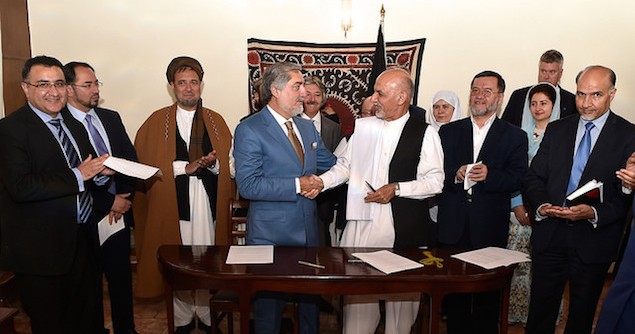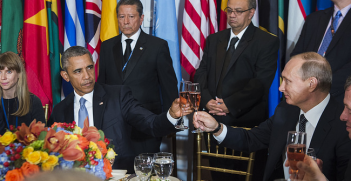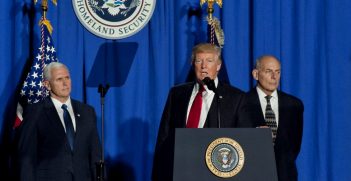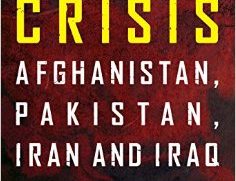Challenges Ahead for Afghanistan's New President and Government of Unity

In the aftermath of the first democratic power transition in the country’s history, Ian Dudgeon analyses the upcoming challenges of the unique power-sharing arrangement between Ashraf Ghani and Abdullah Abdullah.
Dr Ashraf Ghani, a former finance minister and ex-World Bank official, was sworn in on 29 September as Afghanistan’s new president. Dr Abdullah Abdullah, a former foreign minister and Ghani’s principal rival in the presidential elections, was also sworn in at the same ceremony as the government’s chief executive officer (CEO).
This unique power-sharing arrangement between the two presidential rivals, brokered during some very tough negotiations led by US Secretary of State John Kerry, has resulted in the formation of a government of ‘national unity’. This has ended, at least for now, the bitter division between the two rivals over the heavily disputed presidential elections, which were characterised by large-scale fraud, allegedly by both sides. Although an internationally supervised recount of the disputed votes was undertaken, with Ghani declared the winner, details of the actual final count have not been released. There is speculation that more than one million of the 7.12 million votes cast were fraudulent, and it might not be possible to actually determine with any accuracy the number of genuine votes; thus who really won the election.
In these circumstances, and to avoid the potential for political chaos and the possibility of civil war if an agreed electoral outcome was not finalised, a government of national unity is widely regarded within key political circles in Afghanistan—as well as the international community—as the best way forward at this time. For many both within and outside of Afghanistan (especially the US), Ghani is the preferred president, and brings to the leadership widely respected knowledge and experience in social transformation and economic development; two key priorities for any new government. Abdullah brings wide political and foreign policy expertise to the leadership, and particularly a solid core of experience in national security matters from amongst Northern Alliance members.
Both Ghani and Abdullah will have to work hard to make their national unity government work. However they dress up the government, it is akin to an arranged and loveless marriage, and only likely to last while the actual power-sharing contract continues to satisfy both parties. But there are many imperatives to make it work. These include their awareness of the fragility of the state in economic, security and societal terms, as well as the necessity to commit to reforms that will begin to seriously address economic development, employment, governance and law and justice. Not only doing so, but being seen to do so will also be essential if the government is to persuade the frustrated and sceptical international community to maintain foreign aid assistance on any significant scale.
One of the large unknowns in addressing the above is the extent to which the provincial governments will work constructively with the Kabul government in implementing related reform programs amongst ‘hearts and minds’ at the grassroots level. The critical challenge will be addressing significant shortcomings of the government at the provincial and district level that have successfully been exploited by the Taliban, particularly in the south and east.
National security in all aspects will be a national priority. Both Ghani and Abdullah have voiced their commitment to pursuing reconciliation with the Taliban, inviting them to join in peace talks and cease fighting. So far, the Taliban have rejected these overtures. While not unexpected, this response places the onus on the Afghan Security Forces (ASF) to continue to combat the Taliban, and to contain or—where possible—mitigate the threat they pose in parallel with anticipated political gains through effective ‘hearts and minds’ programs.
A major step in Afghanistan’s security program was Ghani’s signing of both the Bilateral Security Agreement (BSA) with the US and Status of Forces Agreement (SOFA) with NATO on 30 September, enabling the ongoing presence and support of US and other foreign forces in Afghanistan, including Australian troops. Estimates put the likely number of foreign troops that remain in Afghanistan post-2015 as high as 15,000; of which about 10,000 will be US forces. The focus of their support is expected to be advice and training, as well as logistics and funding to pay for and maintain the ASF. Generally, foreign forces will not engage in combat operations, although some US Special Forces may still do so under the BSA.
Another major security-related step will be how the Afghanistan-Pakistan relationship unfolds under Ghani, particularly on the issue of alleged Pakistan support to the Taliban. In the short term at least, Ghani may focus on seeking Pakistan’s cooperation to pressure the Taliban, or significant elements within, to explore the prospect of reconciliation. Any serious breakthrough on this front will be a major security achievement, and generally a positive move forward in Afghanistan-Pakistan relations.
The new Ghani-Abdullah government faces many formidable challenges. Effectively meeting them will test not only the commitment of individual political leaders, but also the quality and sustainability of this new unified government as a viable entity in itself. Its success, one hopes, will also set a much needed political benchmark of note amongst political leaders in the troubled region to the west of Afghanistan.
Ian Dudgeon is Presidential Associate of the AIIA. He previously served in the Foreign Affairs and Trade, and Defence portfolios, and has held senior appointments in the Australian intelligence community.





